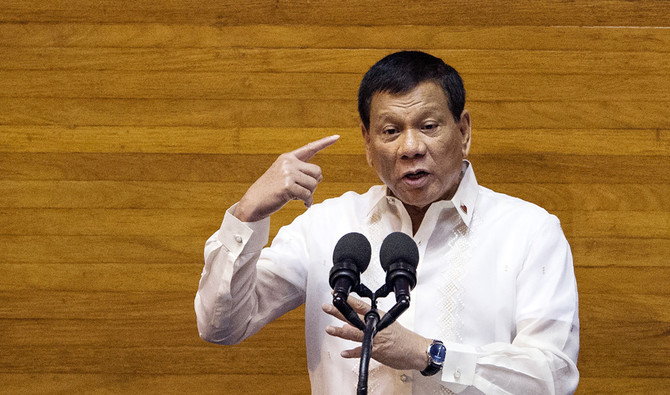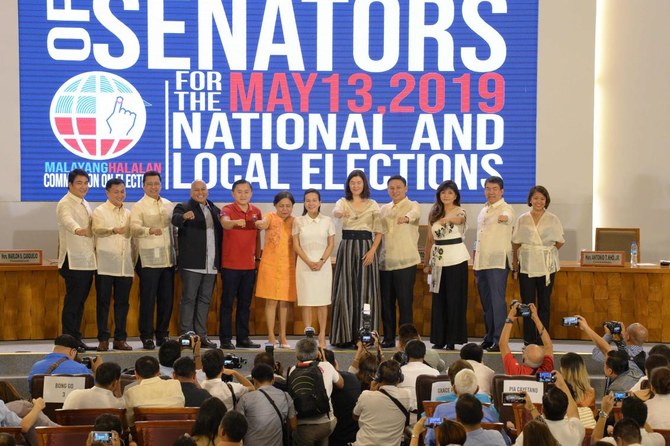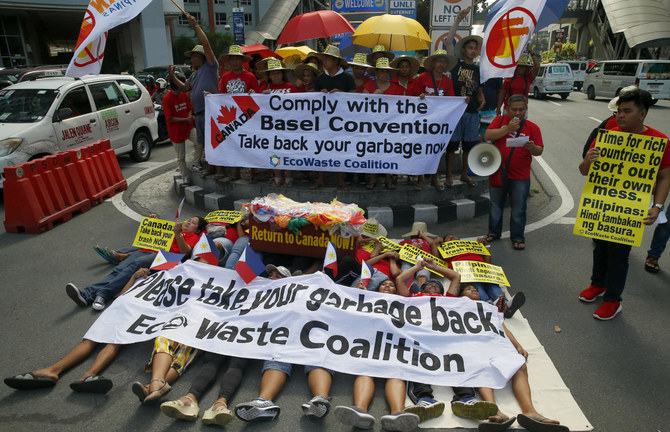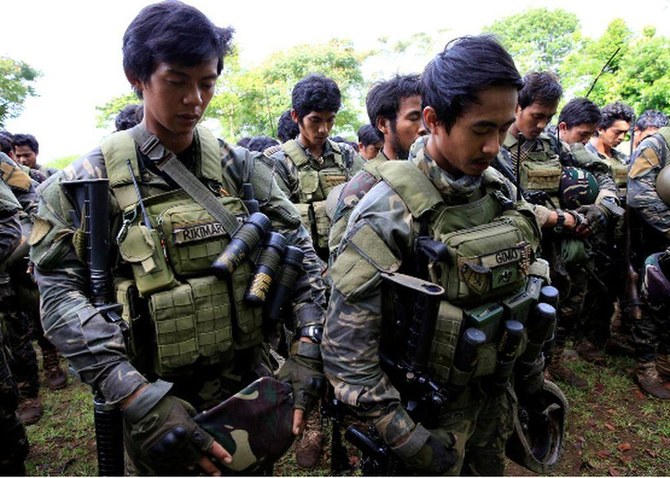Duterte has me giggling so hard - I can hardly stay in my chair! The guy is direct and to the point! Oh - Too funny!
2018-12-31 - Duterte Invokes Holy Allegory in Latest Defense of Critical Thinking
Duterte Invokes Holy Allegory in Latest Defence of Critical Thinking - Eurasia Future
Philippine President Rodrigo Duterte has issued another stern criticism of the Roman Catholic Church in The Philippines – one that was highly allegorical in respect of contemporary political trends in the country. During his speech, Duterte criticized Catholic doctrine in the following way:
“You’re already praying at one God, then you’re going to pray at these cursed saints. There’s only one God. There’s only one God, period. You cannot divide God into 3, that’s silly”.
Turning then to the Biblical recounting of Crucifixion, Duterte said:
“Your God was nailed on the cross. Fuck, how unimpressive. I’m God and you will crucify me? Mother fucker. I’d tell them, ‘Lightning, finish all of them. Burn all the non-believers”…
…Look, those documents were written – if at all – 3,000 years ago. Why would they care about our lives now? Who wrote about them? Who’s Saint Thomas? We don’t know who they are. That might even be a name for a cow or camel then”.
While Duterte’s statements have intentionally caused shock, this is in keeping with his self described method of ‘
shaking the tree‘ in order to awaken in people, a new socio-political mentality that breaks from the complacency of the past. In Duterte’s recent remarks, he used religious allegory and criticism of Catholic doctrine in order to convey several important messages to his people.
Think critically
President Duterte has long made it clear that he does not seek to proselytise anyone towards his specific view of religion which as he has stated many times, accepts the principle of a rational and dignified supreme being but one that is different from the dogmatic belief system of any organised religion. However, in severely criticising a Catholic Church that for centuries in The Philippines was beyond social reproach, Duterte has helped to make it safe for people to criticise all manner of things that they were previously bullied into not criticising.
In other words, by opening the floodgates to harsh criticism of a religious institution, Duterte is creating a safe space in which his countrymen and women can freely criticise corrupt priests, their treatment at the hands of corrupt civil officials, poor politicians and of course also express their criticisms of the deeply flawed 1987 Constitution of the country – a man made (aka oligarch made) document that for many years was treated as something of a national Bible in spite of its multiple shortcomings.
In a country whose people risk becoming overly complacent over multiple matters related to general social and economic progress, Duterte’s harsh rebukes of Catholicism and Church teachings is a signpost that free speech is something that one can lose unless it is used.
A warning to those metaphorically crucifying Duterte
The Philippines is unique as a nation as some of its citizens literally crucify themselves during Easter in order to attempt to relive the pain of their Lord. While authorities officially discourage the practice, this hasn’t stopped mainstream media and the Yellow opposition from metaphorically crucifying Duterte at every opportunity.
But unlike Jesus who turned the other cheek and forgave his earthly killers, Duterte has made it clear that in all circumstances he will fight back whether against Yellow untruth and innuendo, NPA threats or fake news defamation.
Give one’s opponents enough rope
As sure as many of Duterte’s opponents (a minority in the nation, but a vocal one nevertheless), seek to metaphorically crucify the popular people-centred leader, Duterte is more than happy to invite these increasingly hysterical opponents to metaphorically hang themselves on the rope that Duterte constantly gives them. In order words, by speaking in allegedly “outrageous” ways about spiritual shibboleths, Duterte tempts his opponents to react in a threatening, hysterical, irrational and even intellectually violent ways.
While Duterte often lambastes ideas he believes are foolish, he never threatens any individual unless such an individual is a criminal (a terrorist, narco or someone who threatened the President himself). And yet many of Duterte’s opponents who claim to be “Christians” or “liberals” react to his criticism of ideas and of criminality by calling for violence against Duterte – two things that one would have thought were both un-Christian and illiberal by definition.
In this sense, Duterte’s opponents are only as bad as they allow themselves to be and by drawing them out of their proverbial caves, Duterte has helped to at long last expose the rot that lies in many of their minds.
Conclusion
The Philippines is a nation that requires much less public complacency, more critical thinking, less hero worship and more reality checks in order to reform its political system and modernize its economy.
While Duterte spends most of his daytime hours working on policies to accomplish these goals, his lengthy evening speeches provide a necessary wake-up call for the nation at large to develop a new mentality that is compatible with understanding the necessity of these reforms while carrying them forward for years to come.
2018-06-24 - Duterte Preaches The Gospel of Earthly Happiness Against Neo-Imperial Submission to Clerical Meddlers
Duterte Preaches The Gospel of Earthly Happiness Against Neo-Imperial Submission to Clerical Meddlers - Eurasia Future
When criticizing prevalent forms of Christianity the United States, heavy champion of the world Muhammad Ali
said,
We teach our people that heaven is not in the sky — heaven is on earth. Hell is not underground — hell is on earth. The white man told us that heaven is in the sky and hell is under the ground and he takes everything in the middle”.
In many various ethnic contexts throughout the world, missionaries and churches from Europe have exported the attitude that the indigenous people who have been conquered by European imperialists must suffer on earth in order to attain heaven in the afterlife. Meanwhile, the imperialists themselves plunder the natural resources of their conquered lands whether it be water and wood, silver and gold and in more modern epochs, oil and gas.
It was under this imperial pretext that the Roman Catholic Church was brought to The Philippines and even though the country has been independent since 1946, shortly after winning the Presidential election in 2016, Rodrigo Duterte stated that he renounces the colonial mentality in all of its guises whether in the form of so-called NGOs meddling against the political will of the Filipino people, politicians paid for by drug cartels or foreign regimes or indeed the Roman Catholic Church that continues to act as a fifth column, attempting to scandalously undermine Philippine democracy.
Speaking days ago in his home city of Davao, President Duterte made remarks about these subjects which many found controversial. He stated,
“So God was lonely, so he created paradise and that’s planet Earth. And God said, ‘I will create man,’ so there was Adam. God found that Adam was lonely, so he took one of his ribs and created woman. But God doubted his creation so he tested it. He called a snake and told it to give an apple to Eve. Eve ate it and gave it to Adam. And so malice was born.
Who is this stupid God? You created something perfect and then you think of an event that would destroy the quality of your work. How can you rationalise that God? How can you believe him? So now we’re all born with an original sin? Even in the womb, we already have sin. What kind of religion is that?
I believe there is a universal mind. But to what extent is the influence of the – I cannot picture him as a human being…But I really believe, I have this faith and abiding thing about… but don’t believe in religion”.
Duterte here is repeating his long held views that the Catholic Church in The Philippines is a manifold corrupt institution. Like millions of others around the globe,
Duterte himself was a victim of Church violence as a child when he was molested by a priest. Since then, rather than apologizing to Duterte, the Catholic Church has worked consistently to undermine his flagship policies by flouting the constitution and making frequently highly charged politicized interventions in a country where there is legal separation of religion and government. Regarding this,
Duterte stated the following on the 14th of June,
“And I assure you, you can walk around at night and nobody would really bother you. (I will target) drugs, I said, after corruption. I’m a simple man. I have run roughshod against almost everybody—priests, human rights (activists). I don’t give a shit. Those priests and bishops, they didn’t elect me to office. Those (idiots), they’re with the other side”.
Duterte has frequently embraced issues that are red-lines for Catholic Church dogma including
same-sex marriage. While Duterte has expressed personal ambivalence regarding divorce, if the Philippine legislature passes a new divorce law, it is very likely Duterte will sign it.
Recently, Duterte vowed to expose a private dossier regarding the unethical practices of some Catholic priests who have recently been murdered. While many priests blame Duterte for the deaths, the Philippine President has stated,
“We have (a dossier showing the reason why one of the priests was killed). I have a copy of it. But I suppressed that because that’s not good for the Catholic Church. It’s because it involves women. If the Catholic wants, I will release the matrix why the priest was killed. I’m only restraining myself. But I gave a copy to the chairman of CBCP (Catholic Bishops Conference of the Philippines). But if that’s what Soc Villegas (the President of the Catholic Bishops’ Conference of the Philippines) wants, I will release it”.
Even prior to his election as Philippine President in 2016, Duterte has never been shy about criticizing the Roman Catholic Church. During his election campaign, Duterte
stated,
“I will lecture until June 29 the sins of the Catholic Church and whether or not you are still relevant…..Let this election be a referendum between me and the Catholic church”.
In 2017, he
said that Church leaders were “full of shit”. Duterte who himself was a victim of Church abuse has accused clergy of hypocrisy saying,
“You criticize the police, you criticize me. For what? You have the money. You are all crazy … when we were making confessions to you, we were being molested. They are touching us. What is your moral ascendancy, religion? What is the meaning of it!”.
In his frequent criticisms of the Roman Catholic Church, Duterte has invoked the sentiments of Muhammad Ali who like Duterte was a believer in God but one who shunned organised Christianity. In Ali’s case, he found solace in Islam, while for Duterte, like an increasing number of people throughout the world, he has sought spiritual fulfilment outside of the confines of any organised religion. Duterte has always presented himself and acted as servant of the people. He has rejected palatial lifestyles in spite of holding high political office and has worked to take
outdated honorific titles out of the daily lexicon of Philippine politics. He even once stated that he prefers to be addressed by his old title of “mayor” rather than “President”.
Duterte’s attacks of the Roman Catholic Church are similar to his attacks of all elitist organizations that have excelled at taking money and confidence from the people without giving them anything in return. The amount of bribes and even extortion that are common among many perishes in The Philippines reveal a corruption that is little different than that which Duterte has aimed to tackle at a political level. Duterte has also personally addressed how Church dogmas prevent Filipinos from achieving their potential on earth, much as Ali alluded to in his diatribe against the “white man’s church”. Addressing this specific issue during a speech earlier this month, Duterte stated,
“So don’t believe those Catholics, or Adam and Eve. The god of the Catholics, He’s an idiot. Look for a better God. Look, it says in catechism that God created the world. It was a paradise. Then he made man, Adam, and he was lonely so God created woman. It would have been fine but God called the snake and gave it an apple, asked it to give it to Eve. Then Eve tempted Adam to eat the apple and malice became malice. We all sinned. We are all born sinners, son of a whore. What did we have to do with Adam and Eve who were the ones who did the deed? What kind of God was that? Things were perfect then he decides to ruin them. So don’t believe those priests. During my campaign, I felt like peeing, but son of a whore, it took three hours from Robinsons to the airport. I was late. So I said, son of a whore, Pope, you better leave now. I cursed him. Why did he come and cause such a traffic jam? So the God of the Catholics? Baloney! We have a new religion when we get out of here: the church of Rodrigo. No limit. You have an obligation to make yourself happy”.
Contrary to the way many of Duterte opponents have interpreted these remarks,
The President was not attacking the beliefs of ordinary people but was instead attempting to show that the fairest and truest form of spiritual enlightenment does not require sacrificing one’s own potential, one’s own prospects for happiness and fulfilment and one’s own sense of freedom and empowerment just because a cleric whose own earthly riches are generally more vast than the poor men and women coming to the old churches in order to seek salvation say so. Duterte’s concept of earthly salvation, earthly redemption and earthly remuneration for ones labour, are concepts that many modern revolutionaries throughout Latin America invoked when leading people’s revolutions against corrupt lingering imperial regimes and elitist dictatorships. Duterte’s attitude of being a humble servant of the people contrasts sharply with his clerical critics who for years have done little to distribute nor encourage the spreading of wealth among the poorest of the poor. Duterte elaborate on these concepts further during a speech in May of 2017 when he said,
“Priests do nothing but rant. They live in palaces. You should sell those and use the money to buy rice for the poor. And stop collecting money. If you don’t, I will have you arrested for extortion … I do not need martial law. I do not need to declare a suspension of the writ of habeas corpus. You destroy my country, you destroy the youth. I don’t give a shit if all the priests kneel and pray and beg. I have a country to preserve and that is the Filipino nation. It has nothing to do with religion”.
Without firing a shot in anger, Duterte is leading a revolution of the mind – a revolution that aims to create a freer, more open, more confident mentality among the Filipino people that encourages positive thinking rather than hypocritical submission to the cautions of priests who have rarely felt the suffering of those relying on them.
Duterte’s revolution seeks to secularise the political and economic spheres of society while creating an atmosphere where individual men and women can attain a higher form of spiritual enlightenment in the form of improving their lives and their country – all in a manner that itself is free from the outmoded dogmas of an institution that is becoming ever more of an imperial relic.
While some unimaginative commentators mock and deride Duterte for his statements on organised religion, such people themselves often come from a class of exploiters who know nothing of the real hopes and dreams of the exploited who yearn for a peaceful and fulfilling earthly existence.
In future years, Filipinos will likely look back on Duterte as a champion of their freedom, their dignity, their peace and their prosperity. Duterte is not afraid to tackle any
political or religious institution that stands between the people and their progress. For this reason, Duterte, like all great peaceful revolutionaries is setting an example of both earthly and psychological liberation that is long overdue in a country whose people have been held back both by false political and false religious prophets.





